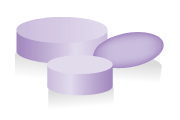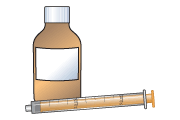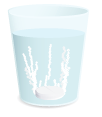Calcium salts for kidney disease
This leaflet is for parents and carers about how to use this medicine in children. Our information may differ from that provided by the manufacturers, because their information usually relates to adults. Read this leaflet carefully. Keep it somewhere safe so that you can read it again.
Do not stop giving Calcium salts without discussing with your doctor, as you may do harm.
Name of medicine
Calcium salts. This medicine may also be called calcium acetate or calcium carbonate.
Brand names: Adcal, Calcichew, Calcichew Forte, Rennie Soft Chews, Remegel, Tums, Calcium-500, Phosex
Why is it important for my child to take Calcium salts?
The kidneys remove phosphate that the body doesn’t need. In children with kidney disease, phosphate levels may build up, putting them at risk of bone problems. Calcium salts are given to bind (mop up) phosphate from food. The salts form calcium phosphate, which is then removed from the body in the stool (poo). Your doctor will check your child's phosphate levels regularly.
It is important that your child takes this medicine regularly to prevent phosphate levels from building up in their blood, which could be dangerous.
What is Calcium salts available as?
- Chewable tablets: Adcal (1.5 g), Calcichew (1.25 g), Calcichew Forte (2.5 g), Rennie Soft Chews (800 mg), Remegel (800 mg), Tums (500 mg), Calcium-500
- Tablets: Phosex (1 g)
- Effervescent tablets: Calcium effervescent (500 mg), Calcium Gluconate effervescent (1g), Calvive
- Liquid medicine (suspension): can be ordered from your pharmacist
When should I give Calcium salts
Your child must take calcium salts just before or during every feed, meal or snack, to bind any phosphate in their meal.
They can take the medicine just before they start feeding or eating, or during their meal. Your doctor will tell you what to do. A dietitian will give you advice about what your child can eat and drink.
If your child has overnight feeds, the calcium salts should be added to their feed as recommended by the specialist doctor who is looking after your child.
How much should I give?
Your doctor will measure the amount of phosphate in your child’s blood and use this to work out how much calcium salt is right for your child. The doctor may therefore change the dose each time you visit. The dose will be shown on the medicine label.
It is important that you follow your doctor’s instructions about how much to give.
How should I give Calcium salts?

Chewable tablets
- Chewable tablets should be chewed and then swallowed.

Phosex tablets
- Tablets should be swallowed with a glass of water, squash or juice. Your child should not chew the tablet.

Liquid medicine
- Shake the medicine well.
- Measure out the right amount using an oral syringe or a medicine spoon. You can get these from your pharmacist. Do not use a kitchen teaspoon as it will not give the right amount.

Effervescent tablets
- Effervescent tablets need to be dissolved in a glass of water or juice. Your child may only need some of this mixture.
- This must be measured using an oral syringe.
- Instructions on how to prepare this mixture and measure the right amount are available here: www.medicinesforchildren.org.uk/advice-guides/giving-medicines/how-to-give-phosphate-or-calcium-from-effervescent-tablets
- Your child should not chew these tablets.
When should the medicine start working?
The medicine takes a while to work and you may not see any difference in your child. Your doctor will monitor your child to check that the medicine is working.
What if my child is sick (vomits)?
If your child is sick, you do not need to give them another dose.
What if I forget to give it?
Calcium salts must be taken at the same time as a meal or snack. If your child has already finished eating when you remember, do not give the missed dose.
What if I give too much?
You are unlikely to cause harm if you give an extra dose of Calcium salts by mistake. If you are concerned that you may have given too much, contact your doctor or local NHS services (details at end of leaflet). Have the medicine or packaging with you if you telephone for advice.
Are there any possible side effects?
We use medicines to make our children better, but sometimes they have other effects that we don’t want (side effects).
Side effects you must do something about
If your child has pain when passing urine (weeing), cloudy urine, blood in their urine, or severe pain on either side of their lower back, they may have kidney stones. Call for an ambulance or take your child to hospital straight away.
If your child has muscle weakness, is more thirsty than normal, seems to pass urine more often than usual, feels sick (nausea) or is sick (vomits) or loses their appetite, contact your doctor, as there may be too much calcium in their blood.
Other side-effects you need to know about
Your child may get constipated (have difficulty doing a poo). If this happens, contact your doctor for advice.
There may sometimes be other side effects that are not listed above. If you notice anything unusual and are concerned, contact your doctor. You can report any suspected side effects to a UK safety scheme at mhra.gov.uk/yellowcard
Can other medicines be given at the same time as Calcium salts?
- You can give your child medicines that contain paracetamol, unless your doctor has told you not to.
- Do not give your child ibuprofen, unless your doctor has said that you can.
Check with your doctor or pharmacist before giving any other medicines to your child. This includes herbal and complementary medicines.
Is there anything else I need to know about this medicine?
Your doctor will monitor your child to make sure the medicine is working properly. It is important to take your child for these check-ups.
General advice about medicines
- If you are not sure a medicine is working, contact your doctor but continue to give the medicine as usual in the meantime. Do not give extra doses, as you may do harm.
- Only give this medicine to your child. Never give it to anyone else, even if their condition appears to be the same, as this could do harm.
- If you think someone else may have taken the medicine by accident, contact your doctor or NHS local services (details at end of leaflet) for advice.
- Make sure that you always have enough medicine. Order a new prescription at least 2 weeks before you will run out.
- Make sure that the medicines you have at home have not reached the ‘use by’ date on the packaging. Give old medicines to your pharmacist to dispose of.
- Try to give medicines at about the same times each day, to help you remember.
Where should I keep this medicine?
- Keep the medicine in a cupboard, away from heat and direct sunlight.
- Some liquid medicine does not keep for long once opened. Write the date that you start it on the bottle and do not keep the medicine for longer than stated on the label.
- Make sure that children cannot see or reach the medicine.
- Keep the medicine in the container it came in.
- It does not need to be kept in the fridge.
Who to contact for more information?
Your child’s doctor, pharmacist or nurse will be able to give you more information about Calcium salts and about other medicines used in the treatment of kidney disease.
England: NHS 111
Tel 111
www.nhs.ukScotland: NHS 24
Tel 111
www.nhs24.scotNorthern Ireland: NI Direct
Wales: NHS 111 Wales
Tel 111
www.111.wales.nhs.ukAdvice on how to give a part dose from effervescent tablets
Kidney Care UK
01420 541124
www.kidneycare.orgCopyright disclaimer
Version [2]. © NPPG, RCPCH and WellChild, all rights reserved. Review by October 2016.
The primary source for the information in this leaflet is the British National Formulary for Children. For details on any other sources used for this leaflet, please contact us through our website, www.medicinesforchildren.org.uk.
We take great care to make sure that the information in this leaflet is correct and up-to-date. However, medicines can be used in different ways for different patients. It is important that you ask the advice of your doctor or pharmacist if you are not sure about something. This leaflet is about the use of these medicines in the UK, and may not apply to other countries. The Royal College of Paediatrics and Child Health (RCPCH), the Neonatal and Paediatric Pharmacists Group (NPPG), WellChild and the contributors and editors cannot be held responsible for the accuracy of information, omissions of information, or any actions that may be taken as a consequence of reading this leaflet.
